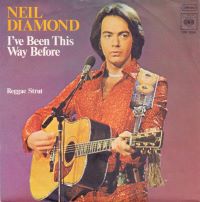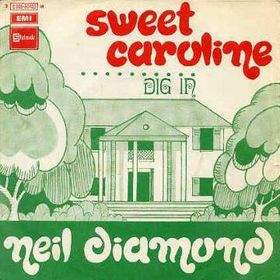
"Sweet Caroline" is a song written and performed by American singer Neil Diamond and released in May 1969 as a single with the title "Sweet Caroline (Good Times Never Seemed So Good)". It was arranged by Charles Calello, and recorded at American Sound Studio in Memphis, Tennessee.
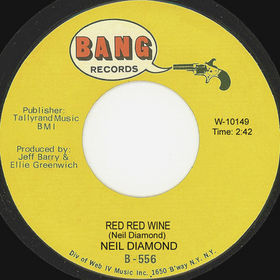
"Red Red Wine" is a song originally written, performed and recorded by American singer Neil Diamond in 1967 that appears on his second studio album, Just for You. The lyrics are written from the perspective of a person who finds that drinking red wine is the only way to forget his woes.

"How Am I Supposed to Live Without You" is a song co-written in 1982 by Doug James and Michael Bolton. The track was originally recorded by Laura Branigan in 1983, charting at number one in both the US and Canadian Adult Contemporary charts. Bolton later recorded his own version of the song that topped the US Billboard Hot 100 and became a worldwide hit.
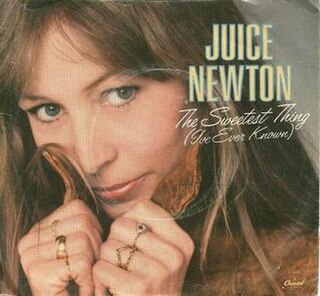
"The Sweetest Thing (I've Ever Known)" is a country-pop song written by Otha Young for Juice Newton in the mid-1970s. Newton was known for charting hits on the Hot 100, Adult Contemporary, and Hot Country charts - and this song has the distinction of being the only single of hers to reach the top 10 on all three of those charts, peaking at #1 on two of them.

"America" is a song written and originally recorded by Neil Diamond, released in 1980 on the soundtrack album of Diamond's film The Jazz Singer. The song was a hit single in the United States in 1981, reaching number eight on the Billboard Hot 100, and was Diamond's sixth number one on the Adult Contemporary chart. Billboard also rated it the #62 pop single overall for 1981. Although the single version was a studio recording, overdubs of crowd cheering simulate the feel of a live performance.
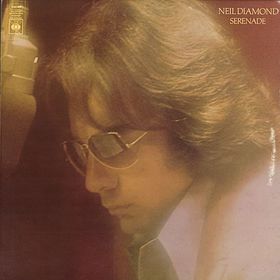
Serenade is the ninth studio album by Neil Diamond, released in 1974. It was his second album for Columbia Records.
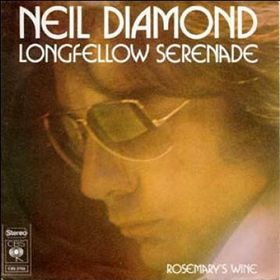
"Longfellow Serenade" is the title of a 1974 song by the American singer-songwriter Neil Diamond. It was written by Diamond, produced by Tom Catalano, and included on Diamond's album Serenade.
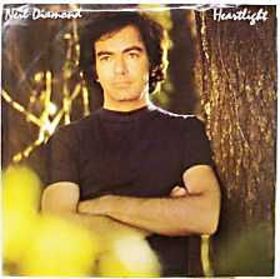
"Heartlight" is a song written by Neil Diamond, Carole Bayer Sager and her then-husband, Burt Bacharach, and recorded by Diamond in 1982. It is the first track on Diamond's 1982 album, also titled Heartlight, and reached number five on the Billboard Hot 100, becoming his thirteenth top 10 hit on the chart. It also spent four weeks atop the adult contemporary chart in late 1982, and was the last of his eight #1s on that chart. Reportedly, it was inspired by the 1982 film E.T. the Extra-Terrestrial, and Diamond allegedly settled with MCA/Universal for $25,000, due to its supposedly drawing on the material of the film.
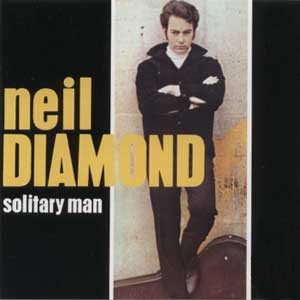
"Solitary Man" is a song written by American musician Neil Diamond, who recorded the song for Bang Records in late January 1966. It has since been covered many times, notably by T. G. Sheppard, Gianni Morandi, Chris Isaak, Johnny Cash and HIM.

"Song Sung Blue" is a 1972 hit song written and recorded by Neil Diamond, inspired by the second movement of Mozart's Piano Concerto #21. It was released on Diamond's album Moods, and later appeared on many of Diamond's live and compilation albums. The song was a #1 hit on the Billboard Hot 100 chart in the United States for one week, the week of July 1, and it spent twelve weeks in the Top 40. It also reached #14 on the UK Singles Chart.

"Forever in Blue Jeans" is a song by Neil Diamond which he co-wrote with his guitarist Richard Bennett. The up-tempo track was released as a single by Columbia in February 1979, having featured on Diamond's album You Don't Bring Me Flowers which was released the previous year. Diamond said about the song: "the simple things are really the important things". It peaked at #20 on the Billboard Hot 100 chart and #2 on the Easy Listening chart in March 1979.
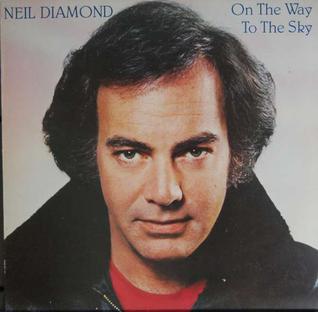
On the Way to the Sky is the fourteenth studio album by Neil Diamond, released in 1981. It contains the hit "Yesterday's Songs", which reached number eleven on the Billboard Hot 100, title track which peaked at number 27 in the US and a third single, "Be Mine Tonight", which also reached the Top 40, peaking at number 35.

"He Will Break Your Heart", is a song originally performed and co-written by Jerry Butler. It was a top-ten hit in 1960.

"Husbands and Wives" is a song written and first recorded by American country music singer Roger Miller. Miller's original, from his album Words and Music, was released in February 1966 and was a crossover hit for him, reaching Top Ten on the U.S. country and Adult Contemporary charts, as well as Top 40 on the pop charts. Since the release of Miller's original, the song has been covered by several other artists, including The Everly Brothers, Ringo Starr, Neil Diamond, a duet between David Frizzell and Shelly West, Jules Shear, and Brooks & Dunn, whose version was a number-one country hit in 1998.

"Yesterday's Songs" is a 1981 single by Neil Diamond from his album On the Way to the Sky. The song was a major adult contemporary radio hit, spending six weeks at #1 on the U.S. Billboard chart and four weeks atop the Canadian Adult Contemporary chart. On the Billboard Hot 100, it peaked at #11. On the Canadian pop charts, the song reached #15. "Yesterday's Songs" is ranked as the 77th biggest American hit of 1982.

"Until It's Time for You to Go" is a song from the 1965 album Many a Mile by American singer-songwriter Buffy Sainte-Marie. Sainte-Marie included a French-language reworking of the song, "T'es pas un autre", on her 1967 album Fire & Fleet & Candlelight. French translation was made by Quebecer songwriter Claude Gauthier.

"That's the Way I've Always Heard It Should Be" is a song performed by Carly Simon, and the lead single from her self-titled debut album Carly Simon (1971). Her friend and frequent collaborator Jacob Brackman wrote the lyrics and Simon wrote the music. The song reached peak positions of No. 10 on the Billboard Hot 100 chart and No. 6 on the Billboard Adult Contemporary chart. The song also earned Simon a nomination for Best Female Pop Vocal Performance at the 14th Annual Grammy Awards in 1972, where she also won Best New Artist.

"If You Know What I Mean" is a song written and recorded by Neil Diamond. It is a track from Diamond's 1976 album, Beautiful Noise, and was his third number 1 on the Easy Listening chart, where it spent two weeks. "If You Know What I Mean" went to number 1 for two nonconsecutive weeks and peaked at number 11 on the Billboard Hot 100. In Canada, the song reached number 19 on the pop singles chart and hit number 1 on the Adult Contemporary chart.

"Desirée" is a 1977 song written and recorded by Neil Diamond and included as a track on Diamond's 1977 album, I'm Glad You're Here with Me Tonight. The single peaked at number 16 on the Billboard Hot 100 and reached number one on the U.S. Easy Listening chart to become his fifth number one on that chart. The song likewise reached number one on the Canadian AC chart.

September Morn is the thirteenth studio album by the American singer-songwriter Neil Diamond. Released in 1979, the album includes a disco version of the Motown song "Dancing in the Street" and a remake of "I'm a Believer".
